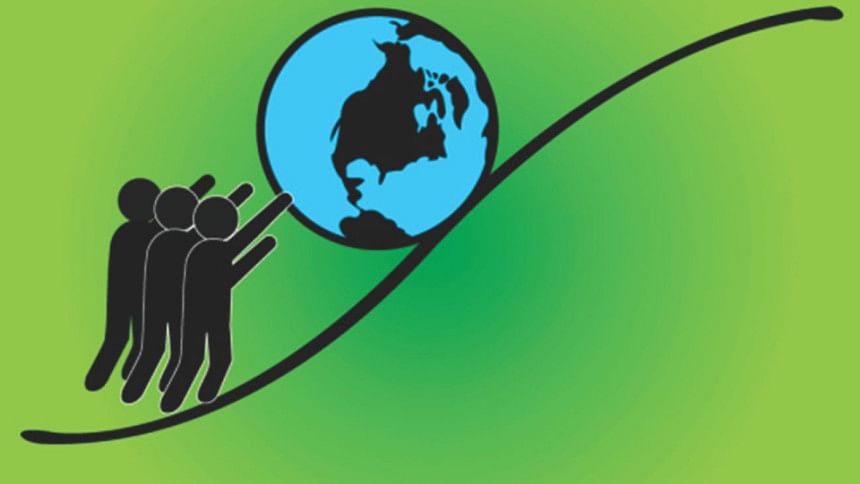Civil society: A key partner for post-2015 development agenda in Asia

Earlier this month, the world took a momentous step forward: the 193 member states of the UN reached an agreement on the new sustainable development agenda that will be adopted this September by world leaders at the Sustainable Development Summit in New York. Concluding a negotiating process that spanned more than two years, the agenda features 17 new sustainable development goals (SDGs) that aim to end poverty, promote prosperity and people's wellbeing while protecting the environment by 2030.
That agenda is set out in the draft outcome document for the forthcoming General Assembly meeting, titled "Transforming Our World: The 2030 Agenda for Sustainable Development." It makes repeated references to the need for a broad global partnership to ensure effective implementation of this ambitious new agenda. Throughout the document, the civil society is repeatedly and consistently mentioned as a core part of this partnership, including an explicit target in the new goals themselves to "encourage and promote effective public, public-private and civil society partnerships."
Precisely because of civil society's role in representing the interests of the poorest, most marginalised and excluded groups, its role seems more urgent than ever before in every aspect of a new agenda which seeks to ensure that no one is left behind, whether in terms of access to health and education, a better environment and more effective action against climate change, and gender equality. And its role in ensuring transparency and accountability of state institutions, facilitating access to justice and access to information, and as a dialogue partner in conflict transformation makes it central to the new goal on peaceful and inclusive societies, one of the most innovative and important of the new pledges to which the world will sign up in September.
Across Asia and the Pacific in the last three decades, the emergence of a vibrant civil society has been a constant feature of the region's unprecedented growth and dynamism, which has delivered record achievements in poverty reduction and the other Millenium Development Goals.
Civil society is now a key partner in every area of UNDP's work in Asia and the Pacific, whether the N-Peace network of women peace builders from across South and South-East Asia, the ASEAN SOGIE caucus and Asia-Pacific Transgender Network who are partnering with us to promote and protect the human rights of LGBT, or the Pacific NGOs who are promoting social accountability initiatives to improve delivery of public services, and regional examples like these are multiplied many times over in our country-level work.
And yet, paradoxically, the space for civil society appears to be under threat as never before. New or proposed restrictions on the operations and funding of NGOs have consistently been in the news in Bangladesh, Cambodia, Fiji, India, Pakistan and Vietnam, but these are just examples of a wider global trend. The International Center for Not-for-Profit Law (ICNL) last year reported that since January 2012, more than 50 countries worldwide have introduced measures constraining civil society, including restrictions on the registration of NGOs and on their ability to conduct advocacy, access ICT and, notably, foreign funding for their activities.
At the dawn of the new post-2015 agenda, it is time to take action to ensure that civil society has the space to play its part to the fullest. We need not only help strengthen civil society's capacities to deliver on the new SDGs, but also ensure that countries develop the right enabling environment for them to do so.
That's why this week in Bangkok, together with a number of partners including USAID, the Asia-Pacific Forum of National Human Rights Institutions, The Asia Foundation, Ford Foundation and ICNL, we have brought together more than 60 participants from governments, civil society, regional and international organisations from all across Asia, the Pacific and beyond, to ask the question: how can civil society and governments better engage with one another in support of sustainable development? And what role should the UNDP - as well as other regional and international actors - play in doing so?
The answers to those questions will direct our regional work in the years ahead, to strengthen civil society space and thereby to enable it to work towards more inclusive and peaceful societies, and more transparent and accountable institutions. Only in that way can the promise of a more prosperous, more equitable and more sustainable world in 2030, to which the UN's member states will commit themselves in September, be achieved.
The writers are Advisor on Governance, Conflict Prevention, Access to Justice and Human Rights at the United Nations Development Programme, and Project Officer working on issues relating to civil society, youth and effective governance at the United Nations Development Programme, respectively.

 For all latest news, follow The Daily Star's Google News channel.
For all latest news, follow The Daily Star's Google News channel. 



Comments